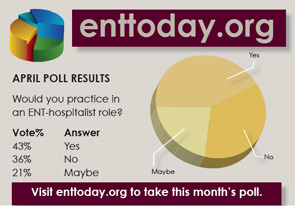Assessing how "good" a doctor is calls into play many different factors that aren’t easily quantifiable

Avoiding Career Burnout Can Be a Challenge for Otolaryngologists
Empathy for Patients on the Decline Among Medical Students and Residents
Studies show that distress, burnout, and depression in medical students and residents have contributed to a recent decrease in their empathy for patients

Time to Retire Your White Coat? Plan your exit strategy carefully
As the physicians of the baby boomer generation approach their golden years, many have achieved career and financial success and are looking for an arrangement that will allow them to ease into retirement. While you may not be ready to hang up your white coat permanently, you may be interested in working fewer hours and taking less call. Retirement requires more than simply removing your name from the office door, however. If you are a physician nearing retirement, it is important that you plan, discuss and make contractual agreements that will allow you to accomplish your goals and changing needs.
Turn a Fellowship Into a Career: How to match up with the right program
The opportunity to gain more surgical experience as a facial plastics fellow was enticing to Hussein Samji, MD, MPH, as he finished his residency at Stanford University School of Medicine in Palo Alto, Calif., in 2010. But after exposure to some of the more mundane aspects of the subspecialty during screening interviews, Dr. Samji said he knew it wasn’t the career path for him.
Interested in a Policy Career? Four programs to get you into the Beltway and beyond
Otolaryngologists with a desire to broaden their careers beyond traditional medical practice have several options. Programs exist that can open doors into medical leadership, health policy work, clinical and outcomes research and public office. Opportunities are available at all stages of a physician’s career. Here’s a look at a handful of programs that aim to provide physicians with the tools they need to take their careers in a new direction.

New Ventures, New Risks: Review all possibilities before affiliating with a hospital
In my January 2011 column (“A Seller’s Market: How to prepare your practice for sale to a hospital”), I described the growing trend of physicians selling their practices to hospitals and large health systems and then working for the hospital or health system. This trend is expected to continue in full force through 2012. As I noted in my January article, the physician’s post-sale arrangement is the driver for the growth of the physician’s practice within the hospital or health system.

Letter: Another ENT-Hospitalist
Regarding the article, “Otolaryngologist Pioneers New Practice Model: Dr. Russell heralds hospitalist role as others ponder the concept’s staying power”…
Residents’ Fellowship and Career Path Preferences
What should residency/fellowship program directors and residents making career choices know about recent trends regarding otolaryngology-head and neck surgery residents? Background: Otolaryngology, which over the years has evolved into a complex […]

Career Shift: Mid-career mentors can help you change course
Like many physicians, otolaryngologists at mid-career may experience some form of burnout and be looking to make a professional shift. Indeed, a study published in the Annals of Surgery last year found that otolaryngologists had high rates of career burnout that paralleled those of trauma and vascular surgeons.
- « Previous Page
- 1
- …
- 3
- 4
- 5
- 6
- 7
- 8
- Next Page »